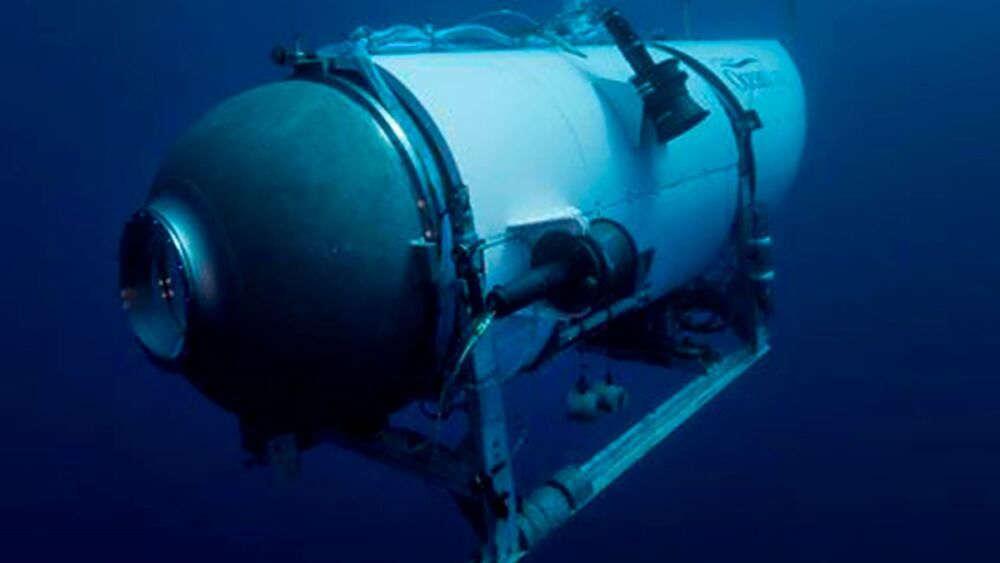Editor’s note: Since the original publication of this article in June 2023, the events surrounding the OceanGate submersible tragedy have continued to capture public interest. A new Netflix documentary — “The Deepest Breath: The Titan Sub Disaster” — offers an in-depth look at the doomed expedition to the Titanic wreck site and the safety concerns that preceded the event. The film provides additional context to themes explored in this article, particularly the consequences of ignored warnings and preventable risk.
On June 24, 1994, our nation suffered a terrible tragedy involving the United States Air Force at an airshow at Fairchild Air Force Base in Washington state. Lt. Col. Arthur “Bud” Holland was the pilot in charge of a B-52, callsign CZAR-52. Holland crashed the plane and died – killing three other airmen with him – and destroyed a multi-million dollar bomber.
Here’s the kicker. Everyone knew Holland was going to crash – it was not a matter of “if” but rather “when and how many people are going to die.” Holland was a rogue pilot, a reckless aviator, and the personification of arrogance, ignorance and complacency. Records show that many people warned the Colonel in charge of the base that Holland was reckless and something bad was going to happen, yet the Colonel did nothing to address Holland’s behavior.
I first learned about this in 1999 when I picked up a great book by Dr. Tony Kern titled “Darker Shades of Blue: The Rogue Pilot.” About five years ago, I picked up another book that featured this same tragedy, as I like to read different authors on the same subject matter. This book, “Warnings Unheeded: Twin Tragedies at Fairfield Air Force Base” by Andy Brown, was pretty similar to the fact pattern described by Dr. Kern in his book, but I learned something new. Five days prior to the crash of the B-52, an airman went into the base hospital and shot the place up, killing a number of people. What do we learn in Andy Brown’s book? Multiple psychiatrists had told the Colonel at the base (yes, the SAME Colonel) that the involved airman was going to do something terrible but those warnings also went unheeded!
Disaster in the ocean
Let’s review another tragedy that involves the ocean and multiple people ending up dead. The launch went to plan and all was running well, but shortly thereafter, tragedy started to unfold. Something went wrong with the involved craft and seven people ended up dead! And what do we learn as this tragedy developed? A number of “experts” had warned that what actually happened was going to happen – and one particular expert — Roger Boisjoly — was “deadly accurate” in his prediction of the tragedy for quite a while before it occurred – and his warning went “unheeded.”
If you think I am talking about the submersible craft dispatched to view the wreckage of the Titanic, you are mistaken! I am talking about the 1986 event we now know as the “Space Shuttle Challenger disaster.” However, all you need to do is substitute the name “Roger Boisjoly” with “David Lochridg,e” and it is a carbon copy of the warning Lochridge provided his employer OceanGate Expeditions (the company offering exclusive tours in a submersible of the ill-fated Titanic), well in advance of the tragedy. Here’s a quote from various news sources about his warnings:
“The submersible industry had significant concerns over the strategy of building a deep-sea expedition submersible without following existing classification safety guidelines.”
Also in 2018, an OceanGate employee was fired after refusing to sign off on manned tests of the vessel over safety concerns, according to court documents seen by the “New Republic.”
Lochridge, an engineer and submarine pilot, said the company fired him to silence him and “avoid addressing the safety and quality control issue” he had highlighted. Lochridge had called for non-destructive testing of the vessel’s hull and “stressed the potential danger to passengers of the Titan as the submersible reached extreme depths,” court documents state. “The constant pressure cycling weakens existing flaws, resulting in large tears of the carbon.”
History will let us know if the above statements are accurate, but I am old enough to think that they are true and that whistleblowers are often attacked and their warnings go unheeded! Sadly, one of the people who ignored the warning was the CEO of OceanGate – Stockton Rush – and how ironic that he was on the Titan submersible when the tragedy occurred.
The common theme behind many tragedies
Many of you know I am an attorney, but few of you know that prior to law school, I did my graduate studies at the Institute of Safety and Systems Management at the University of Southern California. During this three-year window (1975-1977) I got hooked on the study of tragedies and in the preparation of this writing, I reviewed some old notebooks. There is a common theme in each of the below-listed events that ended in tragedy:
- Mount Vesuvius, 79 CE
- The eruption of Mount Tarawera,1886
- The sinking of the Lusitania, 1915
- Indian Ocean tsunami and earthquake, 2004
- The bombing of Pearl Harbor, 1941
- Missouri duck boat sinking, 2018
- Boeing MAX 8 crashes, 2018
I have reviewed the investigations of hundreds of major tragedies and have learned there is a common theme in all of the above – and in too many of the tragedies I have studied in depth – that people knew of the problems lying in wait and had the guts to raise their hand and say “we have a problem,” yet their warnings went unheeded.
To be fair, I am also aware of many people thinking something bad is going to happen when, in fact, nothing bad happens. Also, some people “cry wolf” too often and they lose credibility. But when someone comes up to you and says, “This cop is going to cause major problems for our department” or, “This firefighter is reckless and is going to get killed” or, “This correctional officer is packing a racial bias and is going to hurt someone,” we need to seriously listen to what they are saying and not dismiss them as a “rambling psycho.”
I chose the words “rambling psycho” purposefully because that was what I was called when I reported “some severe problems lying in wait” in a major law enforcement agency (not my employer, the CHP), and I was dismissed and the tragedies (note multiple) unfolded almost exactly as I predicted. And these terrible tragedies are still in the news today!
My word count has been grossly exceeded, but please listen to what people say to you — I mean REALLY LISTEN — and make good solid decisions about how to proceed.
Thanks for taking the time to read my ramblings regarding the management of risk. If you are really into this topic, you can find a copy of my recommended reading list at www.Lexipol.com/presentations.
This article, originally published on June 22, 2023, has been updated. When you buy through links on our site, we may earn an affiliate commission. Thank you for reading and supporting our efforts.













